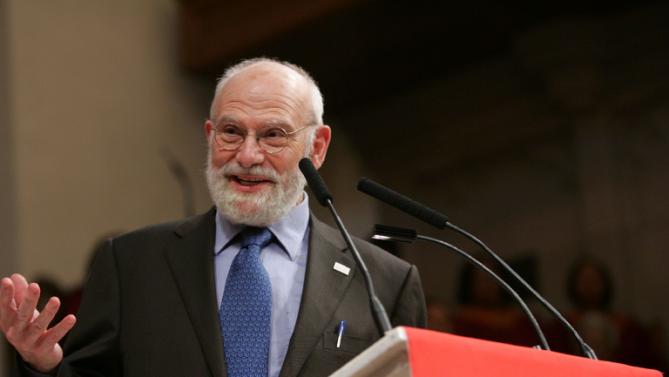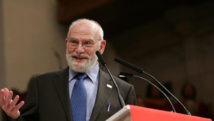Sacks was the author of the 1973 book "Awakenings," which detailed his real-life experience with patients who suffered from a condition known as encephalitis lethargica, and how they were able to exit -- however briefly -- from their catatonic states with the aid of a drug.
The story was adapted into a 1990 Oscar-nominated film of the same name starring Robin Williams and Robert De Niro.
Sacks announced in February that he had been diagnosed with terminal cancer after a rare melanoma of the eye, diagnosed nine years earlier, was found to have spread to his liver.
"I feel grateful that I have been granted nine years of good health and productivity since the original diagnosis, but now I am face to face with dying," he wrote in an essay in the New York Times opinion page.
"It is up to me now to choose how to live out the months that remain to me. I have to live in the richest, deepest, most productive way I can."
Born in London, his parents were both doctors, his mother being one of the first female surgeons in England.
He was educated at Oxford and then emigrated to Canada, and from there went on to the United States, arriving in New York in 1965 where he taught, wrote and practiced for the rest of his life.
At the time of his death, he was a professor of neurology at New York University's School of Medicine.
"NYU School of Medicine acknowledges with sadness the passing of our esteemed colleague Oliver Sacks, MD, whose breakthrough work in the fields of neurology and neuro psychiatry led to important understandings in these fields.
"Equally important, his prolific, award-winning writing touched the lives of millions around the world," the school said in a statement.
Earlier in his career, he was a clinical professor of neurology at Albert Einstein College of Medicine and a professor of neurology and psychology at Columbia University.
He gained a broad public following through his writings, which drew on his personal life and clinical experiences to bring to life the mysteries of the brain and human behavior.
- A writing life -
In "The Man Who Mistook His Wife for a Hat: And Other Clinical Tales," Sacks recounts case studies of patients struggling with neurological orders that have turned their perceptions inside out.
Among his subjects were patients robbed of their past by memory loss, or unable to recognize common objects, or capable of extraordinary mathematical or artistic feats despite their autism.
In "Hallucinations," published in 2012, Sacks ranges across mythology, folk culture literature and his personal experience to explore sensory distortions and their place in the human experience.
His 2007 book "Musicophilia" pondered the power of music to move and to heal, with Sacks himself as "the book's moral argument," in the words of one reviewer.
"Curious, cultured, caring, in his person Sacks justifies the medical profession and, one is tempted to say, the human race," reviewer Peter Kramer wrote in the Washington Post.
The New York Times called him "the poet laureate of medicine."
He wrote for The New Yorker and The New York Review of Books, as well as scientific journals.
As news of his death filtered out, tributes poured in from fellow writers.
"He was like no one in medicine or writing," wrote the surgeon and New Yorker writer Atul Gawande. "I will dearly miss him."
JK Rowling called Sacks "great, humane and inspirational" in a Twitter message that quoted from his recent essay on his impending death.
"Above all, I have been a sentient being, a thinking animal, on this beautiful planet, and that in itself has been an enormous privilege and adventure," he wrote.
-----------------------------------------------------------------------------------------
The story was adapted into a 1990 Oscar-nominated film of the same name starring Robin Williams and Robert De Niro.
Sacks announced in February that he had been diagnosed with terminal cancer after a rare melanoma of the eye, diagnosed nine years earlier, was found to have spread to his liver.
"I feel grateful that I have been granted nine years of good health and productivity since the original diagnosis, but now I am face to face with dying," he wrote in an essay in the New York Times opinion page.
"It is up to me now to choose how to live out the months that remain to me. I have to live in the richest, deepest, most productive way I can."
Born in London, his parents were both doctors, his mother being one of the first female surgeons in England.
He was educated at Oxford and then emigrated to Canada, and from there went on to the United States, arriving in New York in 1965 where he taught, wrote and practiced for the rest of his life.
At the time of his death, he was a professor of neurology at New York University's School of Medicine.
"NYU School of Medicine acknowledges with sadness the passing of our esteemed colleague Oliver Sacks, MD, whose breakthrough work in the fields of neurology and neuro psychiatry led to important understandings in these fields.
"Equally important, his prolific, award-winning writing touched the lives of millions around the world," the school said in a statement.
Earlier in his career, he was a clinical professor of neurology at Albert Einstein College of Medicine and a professor of neurology and psychology at Columbia University.
He gained a broad public following through his writings, which drew on his personal life and clinical experiences to bring to life the mysteries of the brain and human behavior.
- A writing life -
In "The Man Who Mistook His Wife for a Hat: And Other Clinical Tales," Sacks recounts case studies of patients struggling with neurological orders that have turned their perceptions inside out.
Among his subjects were patients robbed of their past by memory loss, or unable to recognize common objects, or capable of extraordinary mathematical or artistic feats despite their autism.
In "Hallucinations," published in 2012, Sacks ranges across mythology, folk culture literature and his personal experience to explore sensory distortions and their place in the human experience.
His 2007 book "Musicophilia" pondered the power of music to move and to heal, with Sacks himself as "the book's moral argument," in the words of one reviewer.
"Curious, cultured, caring, in his person Sacks justifies the medical profession and, one is tempted to say, the human race," reviewer Peter Kramer wrote in the Washington Post.
The New York Times called him "the poet laureate of medicine."
He wrote for The New Yorker and The New York Review of Books, as well as scientific journals.
As news of his death filtered out, tributes poured in from fellow writers.
"He was like no one in medicine or writing," wrote the surgeon and New Yorker writer Atul Gawande. "I will dearly miss him."
JK Rowling called Sacks "great, humane and inspirational" in a Twitter message that quoted from his recent essay on his impending death.
"Above all, I have been a sentient being, a thinking animal, on this beautiful planet, and that in itself has been an enormous privilege and adventure," he wrote.
-----------------------------------------------------------------------------------------









 Home
Home Politics
Politics











